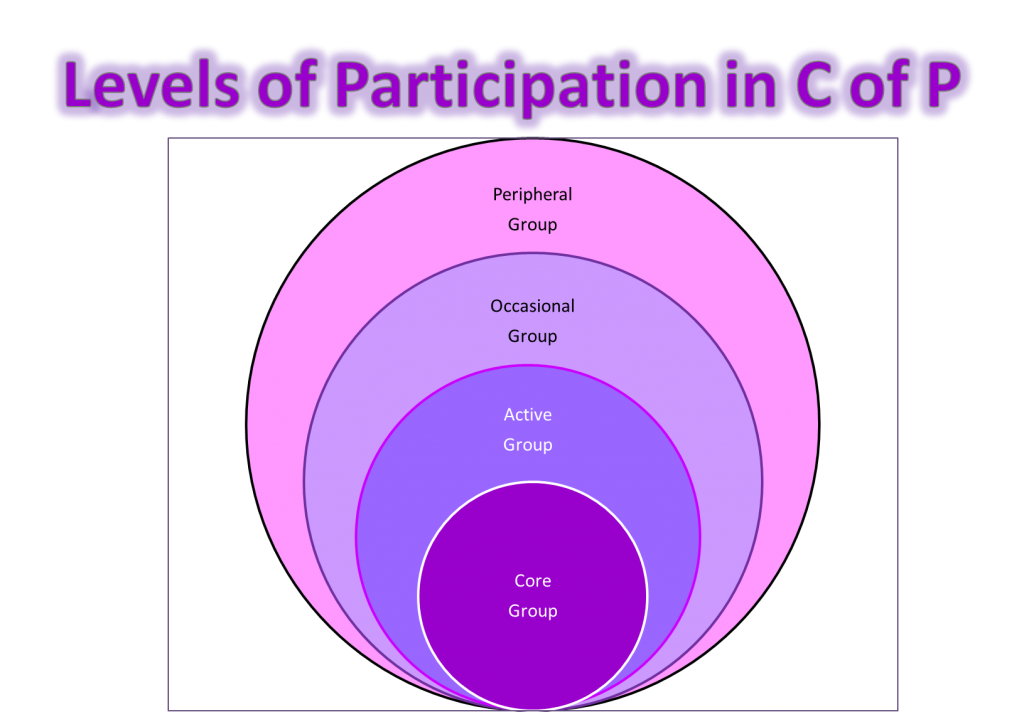Participating in an Online Community~Week 1, Post 2
Disclaimer: This post is part of course requirements following this assignment: Extend your identity in the direction of your career
path and participate in a new online community. Interact online using your projected identity for at least six weeks. Think deeply
about identity and learning and blog twice a week about your experience. Take time to analyze the meaning, power, and constraints of the community on your learning.
~~~~
Week 1 Continued
My first post about joining an online community concluded with my Introduction submission to the Sci-Fi and Fantasy Book Club on Goodreads.
I am a newcomer or novice in the group. In Wenger’s Levels of Participation in Communities of Practice model below, I would label myself as part of the Peripheral Group…at the outer limits of the Peripheral Group, pun intended.
Rereading my Introductory submission, I can see a few of my personality traits evident in just a few lines of text. First, I see my yen for excessive openness and inclusion: (Hi Everyone: every-single-one-of-you-no-matter-what-you-may-be-doing-right-now.) Also I see almost a defensive and guarded persona, explaining away my lack of science-fiction book cred: (I have enjoyed Fantasy books since junior high and high school, but I have never really read much Science Fiction and I really don’t know why.) Then, the community organizer/teacher in me takes over and I end the Introduction with an approval-seeking assignment for the membership: (I wonder: does Hitchhiker’s Guide “fit” in Science Fiction?).
That this group accepted my group membership request is truly amazing.
There are time in our lives when learning is intensified: when situations shake our sense of familiarity, when we are challenged beyond our ability to respond, when we wish to engage in new practices and seek to join new communities.” Etienne Wenger, Communities of Practice, page 7
This summer has arched in the direction of Wenger’s description of “learning intensified.” I began a new job with new computer systems, organizational systems, and interpersonal systems. I also took on two new clients and needed to learn their Sharepoint system, curriculum writing practices, billing practices, presentation modules, and in the case of one new client, their new Android Tablet that I would demo to other school districts. And I also began a doctoral program, with many new people in my Learning Cadre and new professors and support professionals to meet, learn about, and learn from their expertise.
These coinciding events did shake my “sense of the familiar.” They approach the fiery volcanic eruptions described by Wenger. Two of the four components of Social Learning Theory which have been the most necessary for me to explore and integrate have been social structure and situated experience.
Gratifyingly, I have experienced both agency and interpersonal conversations in the Sci-Fi and Fantasy Book Discussion Groups on Goodreads. I am already being a member of several communities under my authentic identity. The parameters of this assignment are to join a group under an alternate identity. I chose a gender neutral name for this group identity. I choose “ByTheFire Reading” (i.e. “ByTheFire” is my first name and “Reading” is my surname.) I keep my reading list preferences closed to keep the gender neutrality, reasoning that if group members see my reading list the proverbially reading identity jig will be up.
I was surprised by how quickly my introduction received reply. My Introduction was posted on August 25 at 1:17 pm. I received a reply and an invitation within 12 hours. I was shocked. The group moderator, Chloe*, was kind and inviting and non-judgmental of my self-assigned fledgling science fiction reader status. Her tone and inviting response is something I need to remember to use with others. As a newcomer, I felt included very quickly, which, according to Wenger, is “essential for transformation of identities.” By responding so quickly to my timid request to connect, Penny accorded to me Wenger’s sense of meaning. Of all the components of Wenger’s Social Learning Theory, meaning is the most important. Gray would nod in agreement and add that “central to social behavior is the notion of meaning.”
~~~
Book Source: Wenger, E. (1998). Communities of practice, learning, meaning, and identity. (1st ed. ed.). Cambridge Univ Pr.
and also
Gray, D. E. (2009). Doing research in the real world (2nd ed.). Thousand Oaks, California: Sage Publications.
*Chloe is a pseudonym




